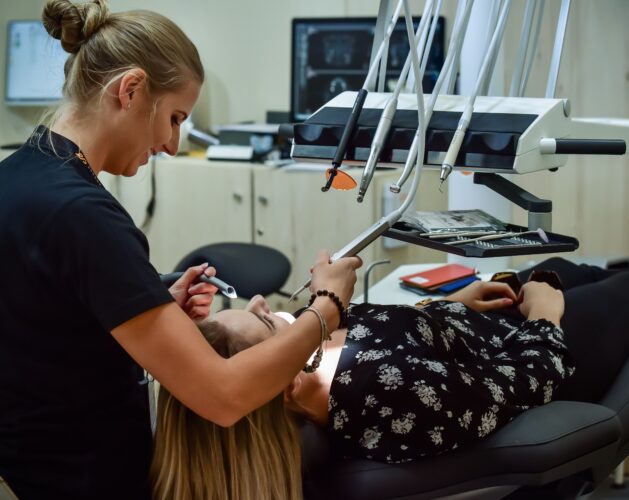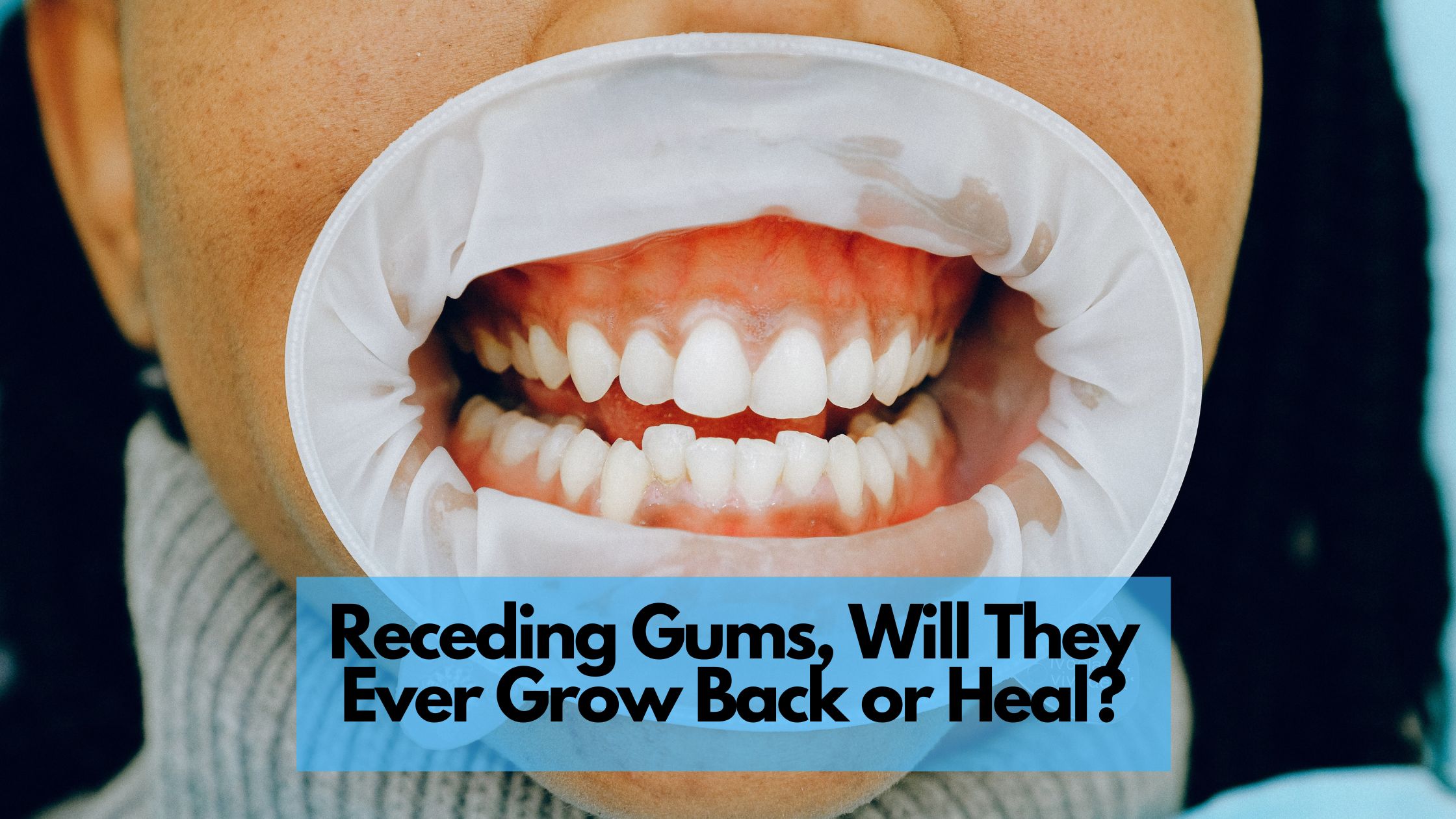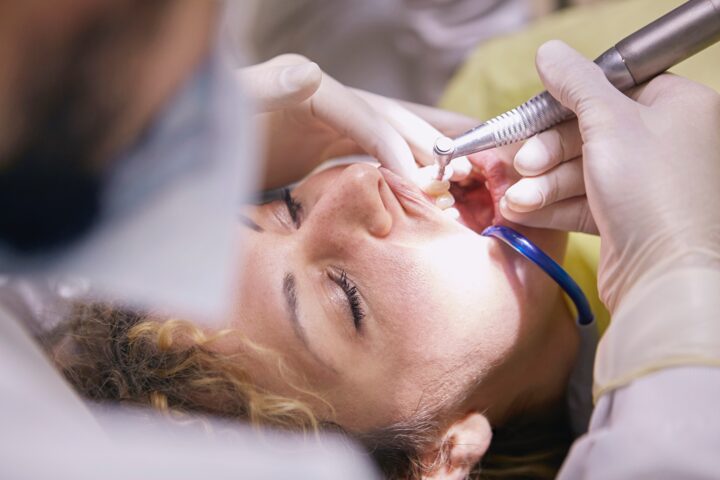The last time you looked in the mirrors, did the gums around your teeth seem to be retreating? You may be experiencing receding gums. If you are, it’s crucial you know that you’re not alone! Of those over 30 living in the United States, over half of the US population have some level of gum recession. However, it can also start as early as your teens. So, you might have the question on your mind, will receding gums ever grow back?
While receding gums aren’t immediately a dental emergency, they shouldn’t be ignored. If you notice that you have receding gums and decide to leave them alone, they can eventually cause serious dental issues. Therefore, as soon as you notice its symptoms, schedule an appointment with your local dentist right away.
What are Receding Gums?
Receding gums are when the gums pull away from the teeth, exposing the roots of the teeth. Due to the roots not having protective enamel like fond on the crown of the tooth, it leaves the teeth highly vulnerable to issues such as decay. Gums that are receding from the teeth also can leave pockets in which bacteria build up. Additionally, this unwanted buildup causes the gum tissues to pull back even more and keep on doing so.
Unlike some tissues in the body, like epithelial tissue that grows back after experiencing an injury, the tissues in the gum do not regenerate like this. Once you have lost a significant amount of tissue, it is, unfortunately, gone forever. However, after you are diagnosed with receding gums, there are various treatments designed to restore the gums’ health and protect your pearly whites.
Signs of Receding Gums

Receding gums are caused by periodontal disease, more commonly known as gum disease. This disease directly targets the gums, which are the tissues that help the teeth stay in place. When poor habits lead to the buildup of plaque, gum disease can eventually occur and cause a number of issues. While receding gums can make the teeth appear longer, gum disease can cause the following symptoms:
- Tender gums
- Red or swollen gums
- Pain while chewing
- Persistent bad breath
- Bleeding gums
- Sensitive teeth
- Loose teeth
If you know any of these signs, contact your dentist and schedule an appointment immediately. The quicker action that is taken can ultimately save you money, pain, and time on treatments.
What Causes Receding Gums?

There are various causes of receding gums. The most common reasons include:
- Tobacco and smoking use: Using tobacco limits blood flow to the tissue inside of your body. It also affects the way your body heals after an infection or injury. Smoking can make gum recession caused by other reasons worse.
- Teeth grinding: Grinding your teeth, during both the day and night, puts high amounts of pressure on the gum tissue. This will eventually lead to gums receding from the teeth.
- Over-brushing: While it might be odd for anyone to hear that they are brushing too much, it can actually lead to gums receding. Brushing too much and using too much pressure will damage both the gums and enamel.
- Oral injury: Injuring your gums, such as through trauma occurring during sports activity or an accident, can cause gums to recede.
If your dentist determines you are suffering from receding gums, don’t worry. There are several options, thanks to modern dentistry advancements, that are designed to treat them. Your dental specialists will also determine the cause of your receding gums so you can make any alterations to your lifestyle to prevent future damage.
Improving Your Gum Care with Sheehan Dental
When bacteria is built up in the pockets, your dentist may recommend deep cleaning, scaling, and root planing. This particular treatment involves removing hardened plaque, also named tartar, from underneath the gum line. Root and scaling planing involved the use of a scraping tool to loosen the plaque, which is then removed using other dental instruments.
This particular dental therapy gives you a chance to “start over” and take better care of your gums. While it will not reverse the gums that have already receded, this clean slate will allow you to prevent the recession from happening again. Some other recommendations your dentist may tell you are:
- Switching from a medium or hard-bristled toothbrush to a soft-bristled one.
- Using an antibacterial, dentist-approved mouthwash each day
- Flossing before brushing your teeth every evening
- Visiting the dentist at least every six months for routine check-ups and monitoring.
Additional Treatment Options for Receding Gums
Gum Graft Surgery
If your gums have receded to the point where the roots of the teeth are exposed, you may be eligible for gum graft surgery. This particular surgery takes gum tissue from the top of the palate or from a donor to cover the root that is exposed. This procedure helps reduce the discomfort of tooth sensitivity while at the same time fighting back against additional gum recession.
Regenerative Procedure
During a regenerative approach, the specialist removes the bacteria and folds back the infected gum tissue.
Periodontal Pocket Procedure
If the tissue in the gums has been destroyed to the point that unmanageable or deep pockets form around the teeth, your dentist might recommend periodontal pocket surgery. During the treatment, the tissue is folded back, and the infected part is removed. Then the tissue is unfolded and secured back around the tooth.
So, Can Receded Gums Grow Back?
Unfortunately, gums that have receded can not grow back. However, the various treatments available to patients allow them to stop it in its tracks. After undergoing a procedure, with the help of your specialists and proper dental hygiene, you can avoid further recession. Therefore, once you have received your treatment, it is essential you:
- Brush twice a day
- Floss in the evening
- Visit the dentist at least two times a year
- Make changes to certain lifestyle habits like smoking
- Avoiding eating sugary foods in excess
- Among others
Contact Sheehan Dental to Treat Receding Gums
If you think that you are suffering from receding gums, talk to the professionals at Sheehan Dental. Their team will help you get your beautiful smile back while protecting your overall dental health. Book a consultation right away to stop receding gums and their negative effects today.


